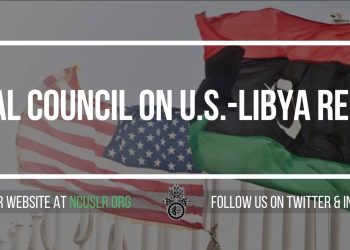By Mohamed Eljarh.
London, 22 March 2103:
A prominent member of Libya’s General National Congress (GNC) resigned Wednesday night. Hassan Al-Amin, the chairman of the Human Rights and Civil Society Committee, announced his resignation on Libyan TV, citing numerous credible death threats against him and his family. He’s since left the country and relocated to London.
Speaking to Hassan Al-Amin today, Friday, he had the following to say about his resignation and about the general situation in Libya:
About the threats, he said that he had been receiving death threats over the phone and text messages. His close aides at GNC, he added, had warned him that the threats were real and serious.
However, Al-Amin insisted that the threats were not the main or only reason for his resignation. He said that he had been opposing Qaddafi for more than 28 years in exile and despite his life being in real danger from Qaddafi’s intelligence and security men, he still continued his opposition, and with all the more determination.
“The real reason behind my resignation was the inability to carry on with my job within GNC effectively, due to political polarisation and political games within GNC between the different blocs.”
When asked about what his thoughts were about the statement read out by Misrata’s local council one day after his resignation, and the claims that the whole matter was nothing more than a personal feud between him and other local militia leaders in Misrata, Al-Amin said :
“The member of the local council leader who read out the statement calling for my dismissal from GNC and that Misrata no longer approves of me as a representative, was calling for my help and intervention a few days before, to tackle the issue of armed militias and their control over the city and over the democratically elected local council”
“The local council in Misrata is at the mercy of those armed militias, and the actual forces controlling Misrata on the ground are the militias. Not the central government and definitely not the democratically-elected local authorities”
“The city of Misrata produced a very strong and encouraging charter for the city, but this charter has been hijacked by those forces that claim only they have the revolutionary legitimacy and that everything in the city should run according to their plans and their plans only”
“Many of those who are using violence and weapons to get their way now, have participated in the political process and failed to win the trust of the people. Now they are trying other means to exerted their influence and presence on the ground. These forces are dangerous and should be confronted.”
“More importantly as Chairman of the Human Rights and Civil society Committee, I couldn’t conduct my work as should be the case. On one of my visits to a prison in Misrata and my efforts to facilitate families’ visits and help them get in touch with their detained relatives, I was personally insulted for those efforts by the militias in charge of the prison”
“I tried to do my job to the best of my ability within GNC, but day after day due to political polarisation within GNC, it became apparent that it has lost track of its real purpose. It became increasingly difficult for the GNC to achieve its main tasks including the constitution, monitoring of the government work, national reconciliation and transitional justice. All these core tasks for the GNC seem to have taken a back seat amid the political polarisation and political point-scoring between the different groups within the GNC”
When asked about the timing of his resignation and why he felt that he couldn’t do his job anymore. Al-Amin said:
“It was on 5 March, when armed protestors besieged GNC members as they debated the [Political Isolation] law. The protesters were attempting to pressure GNC members into passing the bill. The standoff continued for about 12 hours. It was then when it was clear to me that I would play a far more effective role outside of GNC than as a member inside”
“I wanted my resignation to be a wake-up call to my colleagues in the GNC to understand the dangerous road it is heading towards. We need a change of course within the GNC so that we can be more effective during these very uncertain and turbulent times.”
On the performance of GNC and government Al-Amin said:
“Despite the disappointing performance by the GNC and the government, they remain the only legitimate bodies in Libya and should only be dismissed or dissolved by following legal and democratic processes.
“Those who claim they still have the legitimacy of the revolution in their hands are wrong. The revolutionary legitimacy ceased to exist when Libyans cast their votes on 7 July 2012, to elect their representatives democratically to represent them within the GNC. Civil society organisations should play their role in opposing all forms of violence and use of arms for political purposes, because the use of violence and weapons to make political arguments is becoming dangerous for Libya’s democratic transition”
On the issue of the controversial political isolation law, Al-Amin said:
“I was one of the very first few who have been calling for the Political Isolation Law in Libya, and I did so long before the GNC elections, during the NTC ruling period.
“Those who claim that I am against the Isolation Law are trying to divert the attention from the real problem on the ground. The fact that some forces are willing to use force to get the Isolation Law passed because it serves their interests.
“I am against the way by which some are trying to pass the law, and I am against the use of law for revenge and retribution between the different political groups, because this would be very dangerous for the future of a Libya that we all have fought for.
“The current Integrity Commission is doing a reasonably good job in terms of carrying out the political Isolation process. What the GNC needs to do is to review the Integrity Commission’s remit and the mechanism by which it operates. This review would then enhance the performance and operation of this commission and make it more robust and complaint with International law and ensure respect for human rights.
“Another approach to solve the issue of the controversial Political Isolation Law is by putting the law up for referendum to the Libyan people, and that way it would be the will of the free Libyan people and not the will of any certain group or bloc.”
On possible ways forward for the GNC, Al-Aman said:
“The GNC has to change course, and must come up with a fresh roadmap highlighting the milestones and the crucial tasks, and produce a framework within which these tasks can be achieved.
“These tasks include the election of the constitutional drafting commission, the writing of the constitution, transitional justice and national reconciliation. Also, other important laws such as the prohibition of unlawful detention and torture in prisons and detention centres.”
“The GNC should leave legislating for non-significant laws to the government, so that government can submit proposals for new laws to the special committees within GNC to discuss and express reservations and then put up just for a vote with a simple yes or no.
“The GNC needs to concentrate more on monitoring the government and achieving the significant milestones for Libya’s transitions, rather than engage in little matters that would only slow the pace of progress towards a fully functional democratic state that all Libyans have aspired to.”
When asked if his resignation was final and if there were would be an return to the GNC, Al-Amin had the following to say:
“My resignation has not been accepted yet. However, I am determined that my resignation is final and I am still convinced I would do better outside of GNC.”
When asked if he would be staying in London permanently or he had any plans to return to Libya, Al-Amin said:
“I am only in London temporarily and I am here to recollect my thoughts and review my plans for what I will do next on my mission to help rebuild a fair, transparent and democratic Libya, where only the rule of law is the actual force on the ground.
“I will be returning to Libya mid-April, and my first destination will be Beida, where I already had plans to conduct some workshops and conferences with colleagues there. I lived in Beida before, and I hold much love, admiration and respect for this town. So my first destination upon returning to Libya next month will be Beida.
“My stay in London is only temporary, and my resignation doesn’t mean I will not return to Libya. On the contrary, I will look forward to visiting Tripoli, Misrata and all of Libya upon my return. I haven’t given up on Libya. I will never give up on Libya.” [/restrict]











